Event
International Forum: How Democracies Counter the PRC’s Economic Coercion
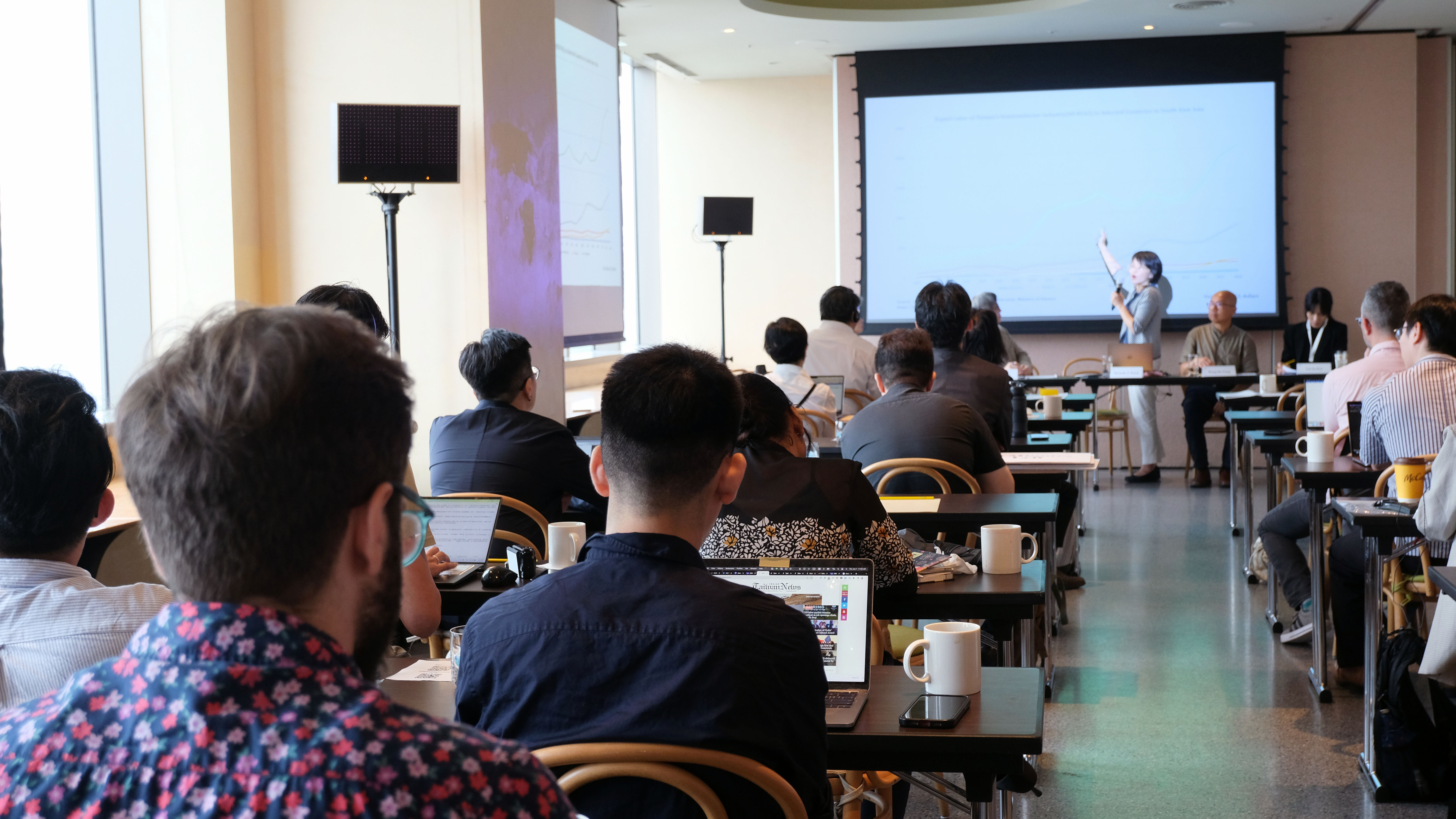
Conference Panel on Concepts and Typologies of the PRC’s Economic Coercion
© FNF Global Innovation HubChina’s economic and political influence has grown significantly in recent years and its coercive economic practices have garnered global attention. Nevertheless, discussions and research on this issue are only in their infancy. This is why, on June 1st 2023, the Taiwan Economic Democracy Union (EDU) and FNF Global Innovation Hub jointly organized an international forum in Taipei, inviting eight experts from democracies to share their insights on China's approaches of economic coercion, their impacts on the democratic world order and fair trade, and strategies to effectively counter these challenges. Let us share the key takeaways from the two conference panels on “Concepts and Typologies of the PRC’s Economic Coercion” and “Democracies’ Counter Strategies Against PRC’s Economic Coercion.”
Concepts and Typologies of the PRC’s Economic Coercion
The practice of “economic coercion” is by no means limited to China, nor is it solely confined to the past few years. Prof. Dr. Ho-Fung Hung (Johns Hopkins University) highlighted that, even though it holds a negative meaning today, economic coercion was once a relatively neutral approach of foreign policy used to achieve political and diplomatic goals. For example, in the 1990s, when the US sought to promote human rights in China through economic means, China employed extensive lobbying to call on the US to separate human rights from trade.
Dr. Michelle Fei-Yu Hsieh (Academia Sinica) examined Taiwan’s trade relations with and dependency on China. Contrary to popular belief that China is Taiwan’s biggest trade partner, leaving Taiwan vulnerable to economic coercion from China, Dr. Hsieh emphasized that “Taiwan’s increasing exports to China actually take place in the context of triangular trade in the global supply chains, where intermediate inputs are exported to China and final products are assembled in China for re-export to other countries.” Moreover, global supply chains are currently under restructuring, and many businesses are re-shoring back to Taiwan for government incentives and to access the broader ecosystem for product development. The SMEs in Taiwan have formed industrial clusters such as the Science Parks in Hsinchu and Southern Taiwan that focus on semiconductors, and the Central Taiwan Science Park which puts great emphasis on machinery. In cooperation with worldwide production lines, these industries make Taiwan an indispensable supplier in the global value chains.
Prof. Dr. Jieh-Min Wu (Academia Sinica) highlighted that due to the scale and nature of cross-straits trade relations, China possesses numerous opportunities to harness economic coercion and weaponize such interdependence to threaten Taiwan. Nancy Pelosi’s visit to Taiwan is one prominent example. After Pelosi’s visit, China conducted a large-scale military practice around the island and imposed import bans on Taiwanese food products. Having endured a lot of attacks from China, Taiwan’s experiences provide valuable lessons to other countries in two perspectives: the influence mechanism, which integrates hybrid warfare, cognitive warfare and diplomatic tactics; and the pushback, which is mainly initiated and led by civil society, influencing the stances and opinions of political parties in Taiwan.
Democracies’ Counter Strategies Against PRC’s Economic Coercion
As globalization deepens, countries become more integrated into the world economy, thereby creating more chances for one country to intervene in the sovereign decisions of another country through trade and investment. China, among all countries, has become an “expert” in exercising economic coercion. China’s economic coercion has three main features: Firstly, it is mainly imposed against democratic countries, aiming to influence their political preferences and voting behavior, potentially leading to regime shift and policy changes. Secondly, China often adopts ambiguous means, which may be masked under public health or food safety concerns. Lastly, China also uses civilian power for economic coercion, such as inciting the nationalism of Chinese people to boycott foreign products.
To successfully counter Chinese economic coercion, Dr. Chien-Huei Wu (Academia Sinica) said that coordination and cooperation between like-minded, economically resilient democracies is essential. In other words, democracies should stand in solidarity when a country is subject to China’s economic coercion and demonstrate their willingness to confront China’s tactics. Similarly, Prof. Dr. Yi-Feng Tao (National Taiwan University) suggested several strategies for democracies to resist China’s economic coercion, including collective counteractions, strengthening economic resilience through industrial upgrades like high-tech agriculture, diversifying away from China’s market to reduce economic dependency, and advocating democratic values and human rights.
Dr. Thung-Hong Lin’s (Academia Sinica) research indicated that China’s Taiwan policy has shifted from “incorporation” based on economic benefits and “propaganda” with soft power to a more aggressive and intimidating demonstration of authoritarian sharp power whenever Taiwan advances in trade and diplomacy. To address this issue, Dr. Lin urged the Taiwanese government to adopt a more decisive judicial and diplomatic strategy while collaborating with civil society to develop mechanisms for democratic defense. Moreover, it is equally important that Taiwanese businesses be mindful not to become the CCP’s puppets.
Apart from Taiwan, neighboring countries such as Australia, New Zealand, India, Japan, and even European countries like Germany are also under extensive influence and coercion from China. Prof. Dr. Chisako T. Masuo (Kyushu University) took several past conflicts between Japan and China as examples, explaining how those conflicts prompted Japanese businesses to reconsider their operation in China. To reduce its dependency on China, Japan is currently rebuilding its supply chains and implementing its data control measures. Similarly, Dr. Sana Hashmi (Taiwan-Asia Exchange Foundation) pointed out that India has been struggling with trade imbalance with China, and the Indian government has launched several initiatives such as building investment corridors and signing cooperation agreements with Japan.
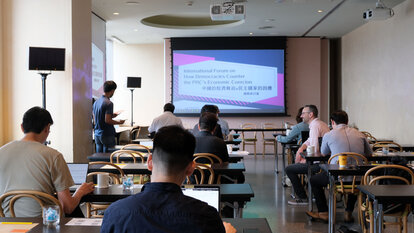
Guests are arriving at the conference venue
© FNF Global Innovation Hub
Prof. Dr. Lin Chia-He during his opening remarks
© FNF Global Innovation Hub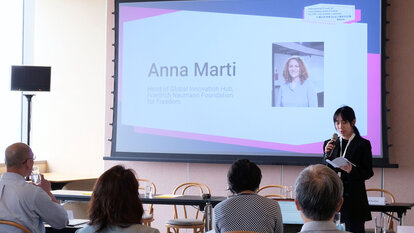
Yu-Fen Lai, Program Officer Digital Transformation at FNF Global Innovation Hub, during the opening remarks.
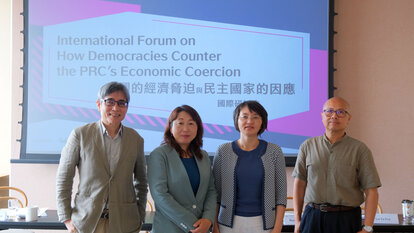
Panelists (from left to right): Prof. Dr. Wu Jieh-Min, Prof. Dr. Chisako T. Masuo, Dr. Michelle Fei-yu Hsieh, Prof. Dr. Hung Ho-Fung
© FNF Global Innovation Hub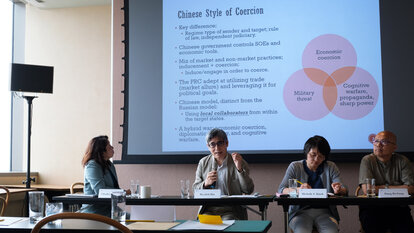
Prof. Dr. Wu Jieh-Min during his presentation "Some Reflections on China’s Economic Coercion: Concepts and the Case of Taiwan"
© FNF Global Innovation Hub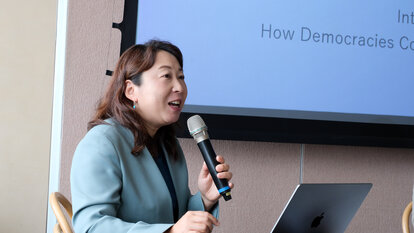
Prof. Dr. Chisako Masuo during her presentation "China’s Changing Tactics for Economic Coercions: Goods, Data and Individuals"
© FNF Global Innovation Hub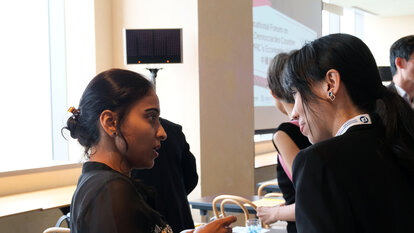
Time for networking at the conference (Dr. Sana Hashmi and Yu-Fen Lai)
© FNF Global Innovation Hub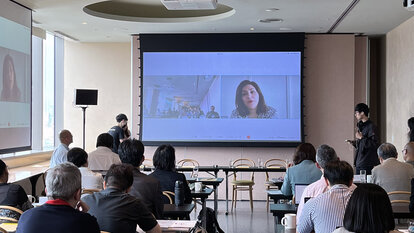
Keynote speech by Svenja Hahn MEP
© FNF Global Innovation Hub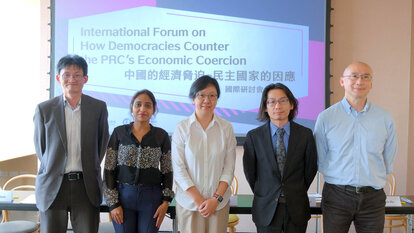
Panelists (from left to right): Dr. Lin Thung-Hong, Dr. Sana Hashmi, Prof. Dr. Tao Yi-Feng, Dr. Wu Chien-Huei, Prof. Dr. Lin Chia-He
© FNF Global Innovation Hub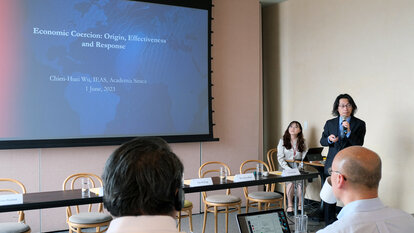
Dr. Chien-Huei Wu during his presentation "How effective is China's economic coercion and how do democratic countries"
© FNF Global Innovation HubIn a globalized world, it is inevitable that countries are economically interdependent. Therefore, diversification in trade and supply chains is crucial to mitigate the risk of falling victim to economic or political coercion by countries seeking to weaponize such interdependence. As Ms. Svenja Hahn, member of the European Parliament, mentioned in her keynote speech during the forum:
It is an absolute priority to foster trade agreements and to work together as liberal democracies so that we can stay strong and not give in to pressure. And that in the future, we will still be able to push for our ideas.

*Panelists from the forum:
-
Hung Ho-Fung (Henry M. and Elizabeth P. Wiesenfeld Professor in Political Economy at Department of Sociology, Johns Hopkins University)
-
Michelle Fei-Yu Hsieh (Associate Research Fellow, Institute of Sociology, Academia Sinica)
-
Wu Jieh-Min (Research Fellow, Institute of Sociology, Academia Sinica)
-
Chisako T. Masuo (Associate Professor, Graduate School of Social and Cultural Studies, Kyushu University)
-
Wu Chien-Huei (Research Fellow, Institute of European and American Studies, Academia Sinica)
-
Tao Yi-Feng (Associate Professor, Department of Political Science, National Taiwan University)
-
Lin Thung-Hong (Research Fellow, Institute of Sociology, Academia Sinica)
-
Sana Hashmi (Postdoctoral Fellow, Taiwan-Asia Exchange Foundation)
*This article is written by Rebecca Kuo, Project Assistant at the FNF Global Innovation Hub Taipei.
